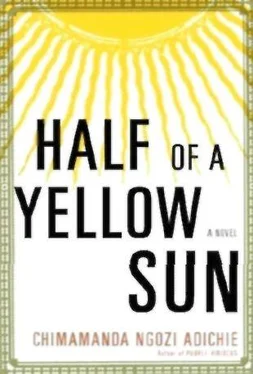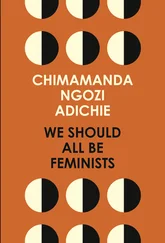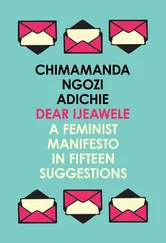"Don't tell any of this to your madam," Master said.
"Yes, sah."
Eberechi visited often, and her smile, a brush of her hand, or her pinching his neck became exquisite joys. The afternoon he first kissed her, Baby was asleep. They were inside, sitting on the bench and playing Biafran whot andshe had just said "Check up!" and placed down her last card when he leaned closer and tasted the tart dirt behind her ear. Then he kissed her neck, her jaw, her lips; under the pressure of his tongue, she opened her mouth and the gushing warmth of it overwhelmed him. His hand moved to her chest and enclosed her small breast. She pushed it away. He lowered it to her belly and kissed her mouth again before quickly slipping his hand under her skirt.
"Just let me see," he said, before she could stop him. "Just see."
She stood up. She did not hold him back as he raised her skirt and pulled down the cotton underwear with a small tear at the waistband and looked at the large rounded lobes of her buttocks. He pulled the underwear back up and let go of her skirt. He loved her. He wanted to tell her that he loved her.
"I am going," she said, and straightened her blouse.
"What of your friend the army officer?"
"He is in another sector."
"What did you do with him?"
She rubbed the back of her hand against her lips as if to wipe something off.
"Did you do anything with him?" Ugwu asked.
She walked to the door, still silent.
"You like him," Ugwu said, feeling desperate now.
"I like you more."
It didn't matter that she was still seeing the officer. What mattered was the more, whom she preferred. He pulled her to him but she moved away.
"You will kill me," she said, and laughed. "Let me go."
"I'll escort you halfway," he said.
"No need. Baby will be alone."
"I'll be back before she wakes up."
He wanted to hold her hand; instead, he walked so close to her that, once in a while, their bodies brushed against each other. He didn't go far before turning back. He was a short pathway away from home when he saw two soldiers standing next to a van and holding guns.
"You! Stop there!" one of them called.
Ugwu began to run until he heard the gunshot, so deafening, so alarmingly close that he fell to the ground and waited for the pain to drill into his body, certain he had been hit. But there was no pain. When the soldier ran up to him, the first thing Ugwu saw was the pair of canvas shoes, before he looked up at the wiry body and scowling face. A rosary hung around his neck. The burnt smell of gunpowder came from his gun.
"Come on, stand up, you bloody civilian! Join them there!"
Ugwu stood up and the soldier slapped the back of his head and a splintering light spread to his eyes; he dug his feet into the loose sand to steady himself for a moment before he walked over to join the two men standing with their arms raised high. One was elderly, at least sixty-five, while the other was a teenager of perhaps fifteen. Ugwu mumbled a "good afternoon" to the elderly man and stood next to him, arms raised.
"Enter the van," the second soldier said. His thick beard covered most of his cheeks.
"If it has come to this, that you are conscripting somebody my age, then Biafra has died," the elderly man said quietly.
The second soldier was watching him.
The first soldier shouted, "Shut up your stinking mouth, agadi!" and slapped the elderly man.
"Stop that!" the second soldier said. He turned to the elderly man. "Papa, go."
"Eh?" The elderly man looked uncertain.
"Go, gawa."
The elderly man began to walk away, at first slowly and uncertainly, his hand rubbing the cheek where he had been slapped; then he broke into an unsteady run. Ugwu watched him disappear down the road and wished he could leap across and clutch his hand and be propelled along to freedom.
"Get into the van!" the first soldier said. It was as if the elderly man's leaving had angered him and that he held not the second soldier but the new conscripts responsible. He shoved the teenager and Ugwu. The teenager fell and quickly scrambled to his feet before they climbed into the back of the van. There were no seats; old raffia bags and rawhide canes and empty bottles lay scattered on the rusting floor. Ugwu was startled to see a boy sitting there, humming a song and drinking from an old beer bottle. Ugwu smelled the harshness of local gin as he lowered himself next to the boy and thought that perhaps he was a stunted man and not a boy.
"I am High-Tech," he said, and the scent of local gin became stronger.
"I am Ugwu." Ugwu glanced at his oversize shirt, tattered shorts, boots, and beret. He was indeed a boy. No more than thirteen. But the dry cynicism in his eyes made him seem much older than the teenager crumpled down opposite them.
"Gi kwanu? What is your own name?" High-Tech asked the teenager.
The teenager was sobbing. He looked familiar; perhaps he was one of the neighborhood boys who had fetched water at the borehole before dawn. Ugwu felt sorry for him and yet angry, too, because the teenager's crying made the hopelessness of their situation stark and final. They really had been conscripted. They really would be sent to the war front with no training.
"Aren't you a man?" High-Tech asked the teenager. "I bu nwanyi? Why are you behaving like a woman?"
The teenager had his hand pressed against his eyes as he cried. High-Tech's sneer turned into mocking laughter. "This one doesn't want to fight for our cause!"
Ugwu said nothing; High-Tech's laughter and the smell of gin nauseated him.
"I do rayconzar meechon," High-Tech announced, speaking English for the first time. Ugwu wanted to correct his pronunciation of reconnaissance mission; the boy certainly would benefit from Olanna's class.
"Our battalion is made up of field engineers and we use only the mighty ogbunigwe." High-Tech paused and belched, as if he expected delight from his listeners. The teenager kept crying. Ugwu listened without expression. He suspected it would be important to win High-Tech's respect, and he would succeed only by showing nothing of the fear that was crawling all over him.
"I am the one who detects where the enemy is. I move close by and climb trees and find out the exact location and then our commander will use my information to decide where to set up for our operation." High-Tech watched Ugwu and Ugwu kept his face indifferent. "With my last battalion I used to pretend that I was an orphan and infiltrate the enemy camp. They call me High-Tech because my first commander said I am better than any high-technology spying gadget." He sounded eager to impress Ugwu. Ugwu stretched out his legs.
"That word you call re-con-zar is reconnaissance" he said.
High-Tech looked at him for a moment and laughed and offered the bottle, but Ugwu shook his head. High-Tech shrugged and drank and hummed "Biafra Win the War," tapping his foot on the floor of the van. The teenager kept crying. The first soldier was at the wheel, smoking dried leaves rolled in paper and the smoke was pungent and the drive took so long that Ugwu could no longer hold his urge to urinate.
"Please, I want to piss!" he called out.
The soldier stopped the van and pointed his gun. "Step down and piss. You run, I shoot."
It was the same soldier who, when they arrived at the training camp, a former primary school with buildings sheathed in palm fronds, shaved Ugwu's hair with a piece of broken glass. The rough scraping left his scalp tender, littered with nicks. The mats and mattresses arranged in the classrooms crawled with vicious bedbugs. The skinny soldiers-with no boots, no uniforms, no half of a yellow sun on their sleeves-kicked and slapped and mocked Ugwu during physical training. The parade left Ugwu's arms stiff. The obstacles training left his calves throbbing. The rope-climbing left his palms bleeding. The wraps of garri hestood in line to receive, the thin soup scooped from a metal basin once a day, left him hungry. And the casual cruelty of this new world in which he had no say grew a hard clot of fear inside him.
Читать дальше












